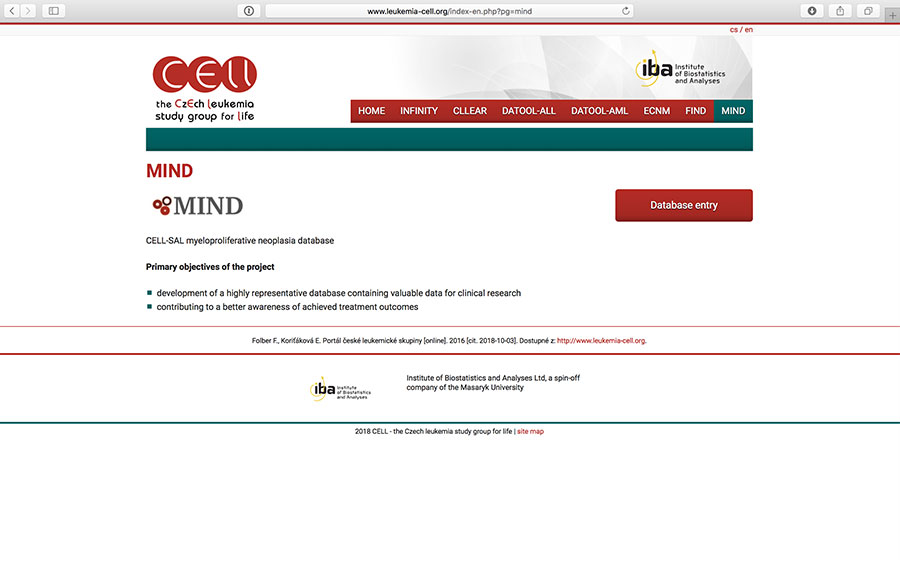
Clinical registry of patients with myeloproliferative disorders.
start of the project: 05/2013
Myeloproliferative disorders are a heterogeneous group of clonal disorders characterised by cellular proliferation of one or more haematological cell lines.
Myeloproliferative disorders include: chronic myeloid leukaemia (CML), polycythaemia vera (PV), essential thrombocythaemia (ET), and primary myelofibrosis (PMF). Their common characteristics involve an excessive production and accumulation of one or more blood cell types (erythrocytes, granulocytes and thrombocytes), a chronic course, a tendency to a change to another type of myeloproliferative syndrome and to a blast crisis, and relatively frequent thrombotic and bleeding complications. Causative factors in the development of myeloproliferative disorders have not been clearly established yet. However, it is known that a mutation at a specific location in the JAK2 gene is typical for many myeloproliferative disorders.
- Chronic myeloid leukaemia (CML) – a disorder arising from an abnormal pluripotent stem cell, which is linked to the presence of the Philadelphia (Ph1) chromosome. Staging in chronic myeloid leukaemia (CML) is described in three phases: chronic phase, accelerated phase, and blast phase.
- Polycythaemia vera (PV) – a disorder characterised by an excessive proliferation of blood cells, especially erythrocytes.
- Essential thrombocytaemia (ET) – a disorder characterised by an excessive production of blood platelets (thrombocytes).
- Primary myelofibrosis (PMF) (or chronic idiopathic myelofibrosis, CIMF) – a clonal myeloproliferative disease characterized by panmyelosis with intact maturation, progressive bone marrow fibrosis, and multiorgan extramedullary haematopoiesis. The proliferation of an abnormal clone of haematopoietic progenitor cells in the bone marrow and other sites results in fibrosis, or the replacement of the marrow with collagenous connective tissue fibres. This causes the blood-forming tissues to make fewer and fewer blood cells.
The MIND project monitors the diagnostic and treatment procedures in patients with meyloproliferative disorders. The aim of the project is to develop a highly representative database containing valuable data for clinical research, and to contribute to a better awareness of achieved treatment outcomes. The analyses of basic epidemiological and clinical data enable researchers to discuss the results of applied therapeutic approaches. Specialised centres will be subsequently able to cooperate on the proposal of treatment guidelines.
The MIND project belongs to a group of projects solved in cooperation between the Institute of Biostatistics and Analyses and the CELL group. IBA MU provides the technical solution of the registry and data analysis.
- Expert guarantor: Prof. Jiří Mayer, MD, PhD; Prof. Zdeněk Ráčil, MD, PhD
- Partners: large haemato-oncological centres in the Czech Republic
- Anaesthesiology, intensive care medicine
- Cardiology, angiology
- Diabetology, dietetics
- Educational projects
- Emergency medicine, toxicology
- Endocrinology, metabolism
- Gastroenterology, hepatology
- Haematology, haematological oncology
- Immunology, allergology
- Medical genetics
- Nephrology
- Neurology, neurosurgery
- Nursing care
- Obstetrics, gynaecology
- Oncology, radiotherapy
- Ophthalmology
- Paediatrics, neonatology
- Pathology, laboratory medicine
- Pulmonary medicine
- Rheumatology, physiotherapy
- Screening programmes
- Surgery, traumatology, orthopaedics
- Urology
